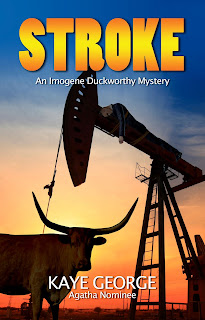Please welcome a special guest. Kaye George is an award-winning writer. As you will see below she writes novels in two very different series: one is cozy, the other not so much historical as pre-historical. She has also published more than fifty short stories.
— Robert Lopresti Here’s What Happened
by Kaye George
Writers live a little and die a little routinely. We’re used to it. I hope. Well, we’re not born used to it. We have to get that way.
When we first start sending queries out to agents, we die a little as each rejection rolls in. Facing rejection, no matter what kind, stings. Rejection when no one likes what you cooked, what you planned to see on TV, how you wear your hair. A lot of effort, toil and trouble, is rejected by an agent or publisher.
An occasional rave rejection (I loved this, but…) gives us a little boost. And when I say “we” I mean “me.” Those are my experiences.
Most mystery writers struggle to place the first book. They are (I was) always looking for advice, the magic formula. How in the heck do you DO it? How do you get someone’s attention and get published, so everyone can read your deathless prose? Your flawless gems of literature, pearls of wisdom? Your Great American Novel? (Make sure you don’t ever use clichés.)
Here’s what happened (well, no, not The Great American Novel, if that’s what you’re thinking)—I had an idea. A brilliant one, of course. A writer with an ancient Roman main character (or maybe Greek, I forget which) said his work was popular, because “the further back you go, the better.” I thought, Hey! I can go back way further than that.
I put aside my Great American Novel, the mystery I’d been working on for 15-20 years, and changed direction.
My love of fossil hunting, fostered by a friend’s family in junior high who took me with them on a couple of trips (I found a beautiful trilobite once!), morphed into an interest in ancient peoples. At about the time I read the above quote, scientists were working on the genome of a Neanderthal whose tiny scrap of DNA had been acquired. Eventually, the whole thing was sequenced. Then new discoveries about these ancient relatives were being published almost weekly and I devoured all of them. One of them was red-headed and freckled! Imagine that!
The next step, since I’d been writing and writing, and collecting all those rejections, was to write a Neanderthal mystery. Tons of research was involved, and many hours of writing, rewriting, getting feedback on what worked and what didn’t—mostly what didn’t. But eventually, after over a year of hard labor, I had a novel I was proud of, so I started to shoot it out. More than one agent broke my heart, telling me how much they loved it and how they weren’t going to take it. “Better than Jean Auel,” one of them said, “but I don’t know how to sell it.”
At the time, I was envisioning this project as a Harry Potter sort of phenomenon, young adult crossover. Instant best seller. Worldwide success. Sell it to Scholastic!! I wanted to reply to those who didn’t know what to do with it. Scholastic published Harry Potter. Surely they’ll want this.
After a year of querying and over 100 rejections, I was so disheartened, I decided to do the things everyone had told me NOT to do. I was angry. I wrote a character who was TSTL (too stupid to live), an inept detective with a funny name, Imogene Duckworthy. I put her in a single-wide, living with her obese mother, and gave her a child out of wedlock. I would show them. NO ONE would like this mystery!
She made every blunder, did everything wrong, and still solved crimes. I had so much fun breaking all the rules. To be honest, I’m not sure what I expected, but it was not an acceptance. I would get this out of my system, then go back to writing real mysteries.
You can guess what happened next, since I’ve written all this build up. It was the first novel of mine accepted for publication. Huh? People liked it.
There’s no formula for mystery-writing, no matter what they say. There is no rule that cannot be broken. It remains one of my most popular series, three books were published and a fourth, Stroke, is coming soon. They have been consistently selling for over 10 years. The Neanderthal one, Death in the Time of Ice, sold too, eventually, and two more in that series, to Untreed Reads—the same people bringing out the fourth Imogene Duckworthy on April 11. They are an awesome outfit.
Here’s the thing. New writers, I have no advice for you. You can follow the rules and have great success, or great failure. You can break all the rules and the same things might happen.
All I know is, this planet is a strange place. Good luck to all of us.












